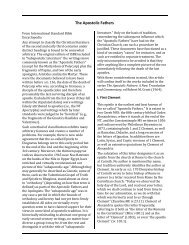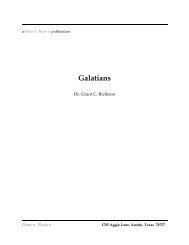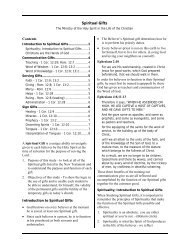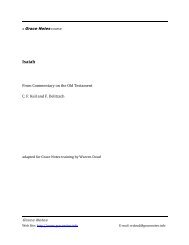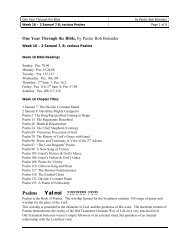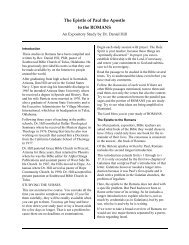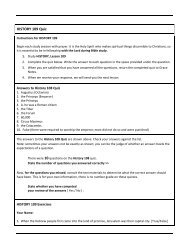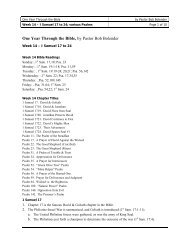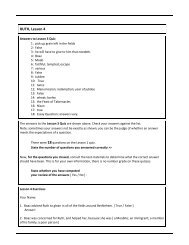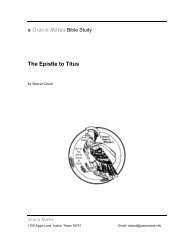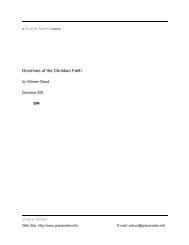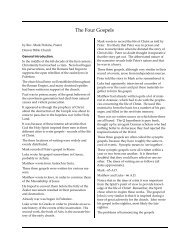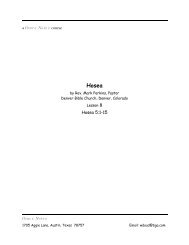Song of Solomon - Grace Notes
Song of Solomon - Grace Notes
Song of Solomon - Grace Notes
You also want an ePaper? Increase the reach of your titles
YUMPU automatically turns print PDFs into web optimized ePapers that Google loves.
SONG OF SOLOMON Page 42By C. F. Keil and F. Delitzscha <strong>Grace</strong> <strong>Notes</strong> studywhich is also there written פּורְׁ יון (after Aruch),cf. Isa. 49:22, Targ., and is once interchangedwith ,פאפליון papilio (parillon), pleasure-tent.But a Greek word in the <strong>Song</strong> is in itself soimprobable, that Ewald describes thisderivation <strong>of</strong> the word as a frivolous jest; somuch the more improbable, as φ ε as thename <strong>of</strong> a litter (lectica) occurs first in suchauthors (<strong>of</strong> the ) as Plutarch, Polybuis,Herodian, and the like, and therefore, withgreater right, it may be supposed that it isoriginally a Semitic word, which the Greeklanguage adopted at the time when the Orientaland Graeco-Roman customs began to beamalgamated. Hence, if mittā, 7a, means aportable bed,—as is evident from this, that itappears as the means <strong>of</strong> transport with anescort,—then appiryon cannot also mean alitter; the description, moreover, does notaccord with a litter. We do not read <strong>of</strong> rings andcarrying-poles, but, on the contrary, <strong>of</strong> pillars(as those <strong>of</strong> a tent-bed) instead, and, as mightbe expected, <strong>of</strong> feet. Schlottm., however, takesmittā and appiryon as different names for aportable bed; but the words, “an appiryon hasKing <strong>Solomon</strong> made,” etc., certainly indicatethat he who thus speaks has not the appiryonbefore him, and also that this was somethingdifferent from the mittā. While Schlottm. isinclined to take appiryon, in the sense <strong>of</strong> a litter,as a word borrowed from the Greek (but in thetime <strong>of</strong> the first king?), Gesen. in his Thes. seeksto derive it, thus understood, from רָ ה ,פָ cit<strong>of</strong>erri, currere; but this signification <strong>of</strong> the verb isimaginary.We expect here, in accordance with theprogress <strong>of</strong> the scene, the name <strong>of</strong> the bridalcouch; and on the supposition that appiryon,Sota 12a, as in the Mishna, means the litter(Aruch) <strong>of</strong> the bride, Arab. maziffat, and nottorus nuptialis (Buxt.), then there is a possibilitythat appiryon is a more dignified word for ’ĕrĕs,1:17, yet sufficient thereby to show that פּורְׁ יָא isthe usual Talm. name <strong>of</strong> the marriage-bed (e.g.,Mezia 23b, where it stand, per meton., forשפרין concubitus), which is wittily explained by(Kethuboth 10b, and elsewhere). The ורבין עליהTarg. has for it the form פּורְׁ יָן (vid., Levy). It thusdesignates a bed with a canopy (a tent-bed),Deut. 32:50, Jerus; so that the ideas <strong>of</strong> the bed <strong>of</strong>state and the palanquin (cf. ,כילה canopy, andbridal-bed, Succa 11a) touch one ,כילת חתניםanother. In general, פוריא ,(פורין) as is also thecase with appiryon, must have been originally acommon designation <strong>of</strong> certain householdfurniture with a common characteristic; for theSyr. aprautha, plur. parjevatha (Wiseman’sHorae, p. 255), or also parha (Castell.), signifiesa cradle. It is then to be inquired, whether thisword is referable to a root-word which gives acommon characteristic with manifold,פר R. from the ,פָ רָ ה Heb. applications. But thesignifies to split, to tear asunder, to break forth,to bring fruit, to be fruitful, and nothing further.Pārā has nowhere the signification to run, asפְׁ רָ א Palest.-Aram. already remarked; only in theis found in this meaning (vid., Buxt.). The Arab.farr does not signify to run, but to flee; properly(like our “ausreissen” = be tear out, to breakout), to break open by flight the rank in whichone stands (as otherwise turned by horsedealers:to open wide the horse’s mouth). But,moreover, we do not thus reach the commoncharacteristic which we are in search <strong>of</strong>; for ifwe may say <strong>of</strong> the litter that it runs, yet wecannot say that <strong>of</strong> a bed or a cradle, etc. TheArab. farfâr, species vehiculi muliebris, also doesnot help us; for the verb farfar, to vacillate, toshake, is its appropriate root-word. With betterresults shall we compare the Arab. fary, which,in Kal and Hiph., signifies to break open, to cutout (couper, tailler une ét<strong>of</strong>fe), and also,figuratively, to bring forth something strange,something not yet existing (yafry alfaryya,according to the Arab. Lex. = yaty bal’ajab fy‘amalh, he accomplishes something wonderful);the primary meaning in Conj. viii. is evidently:yftarra kidban, to cut out lies, to meditate andto express that which is calumnious (a similarmetaphor to khar’a, findere, viii. fingere, to cutout something in the imagination; French,inventer, imaginer). With this fary, however, we



